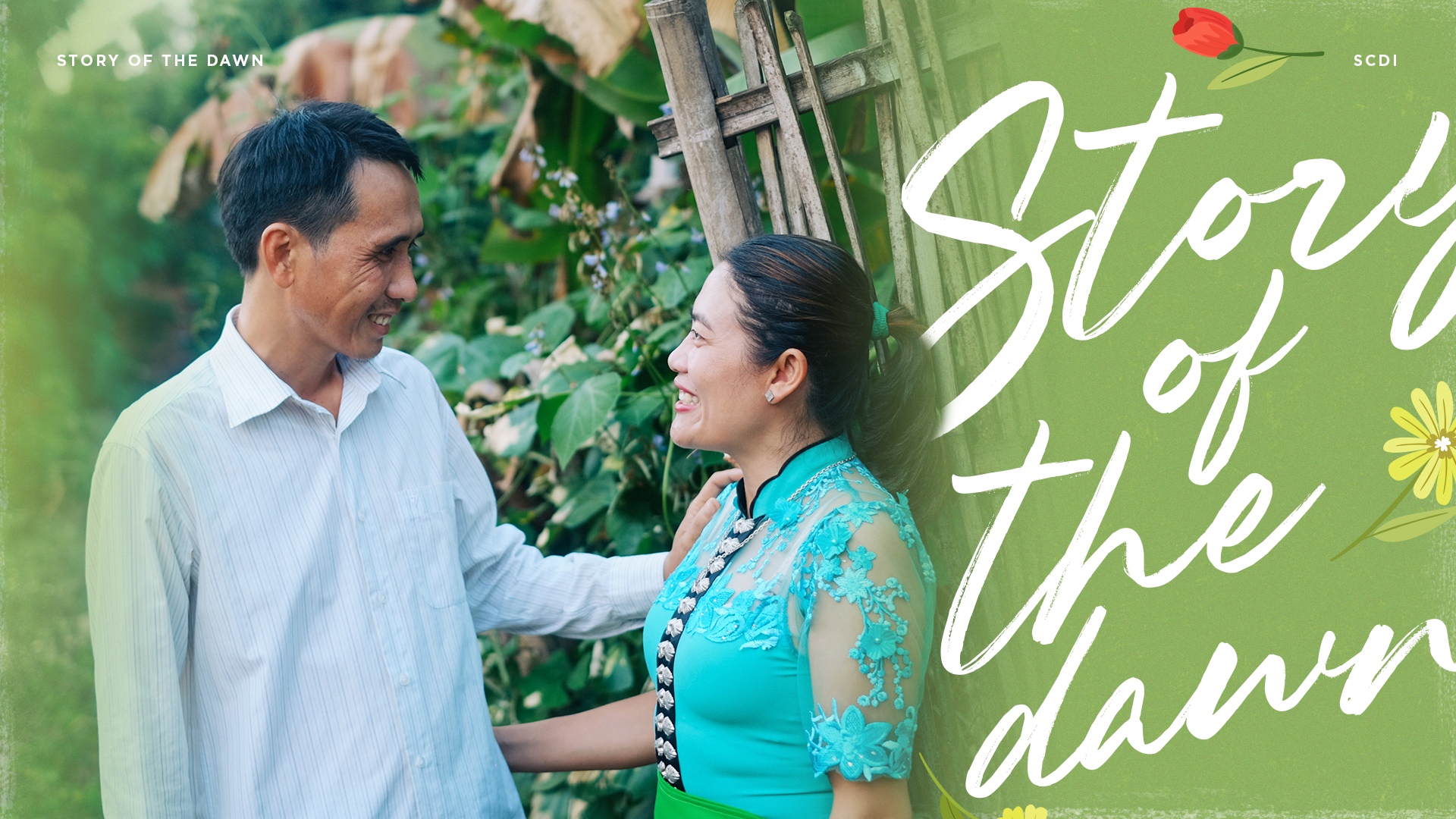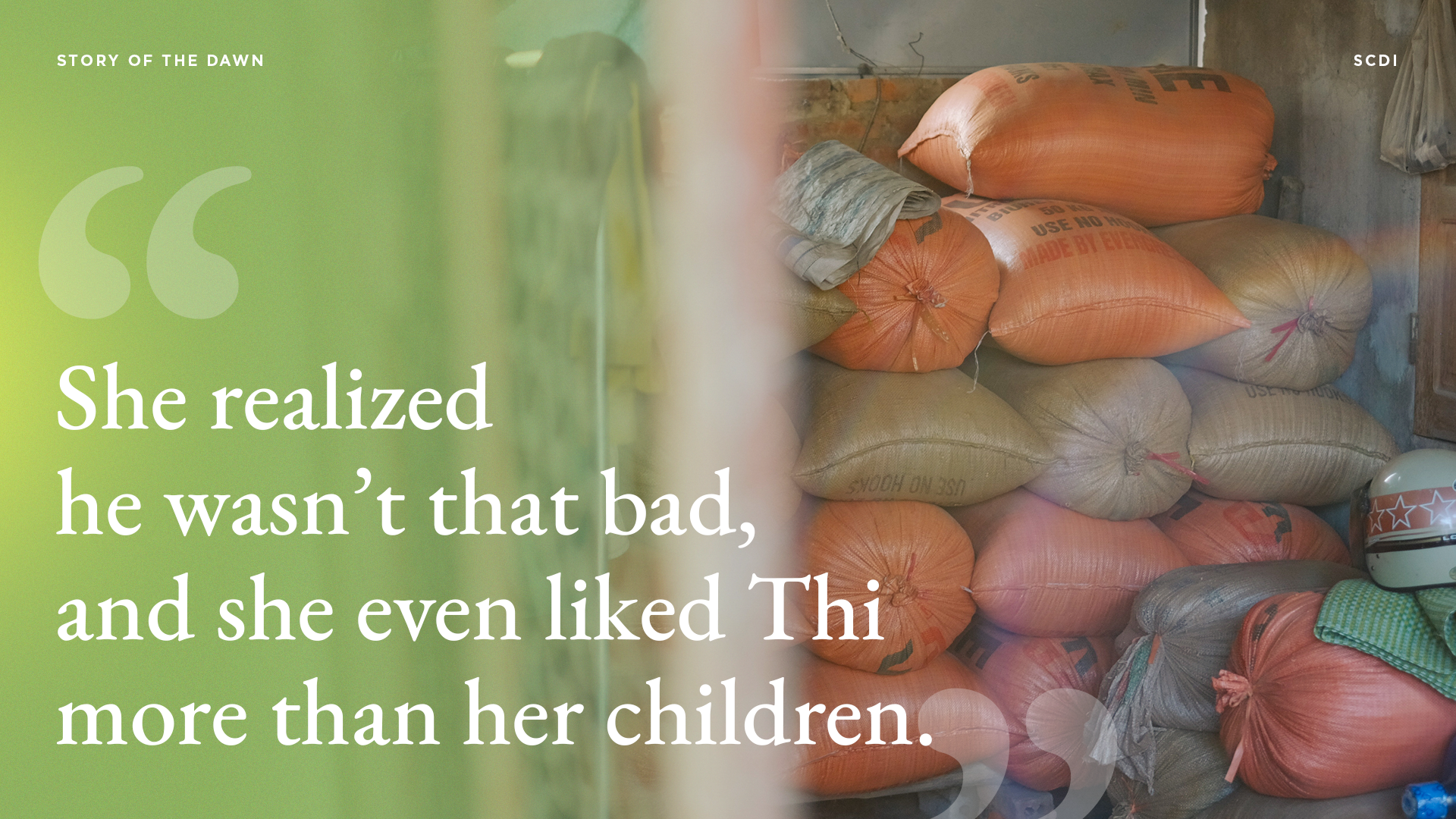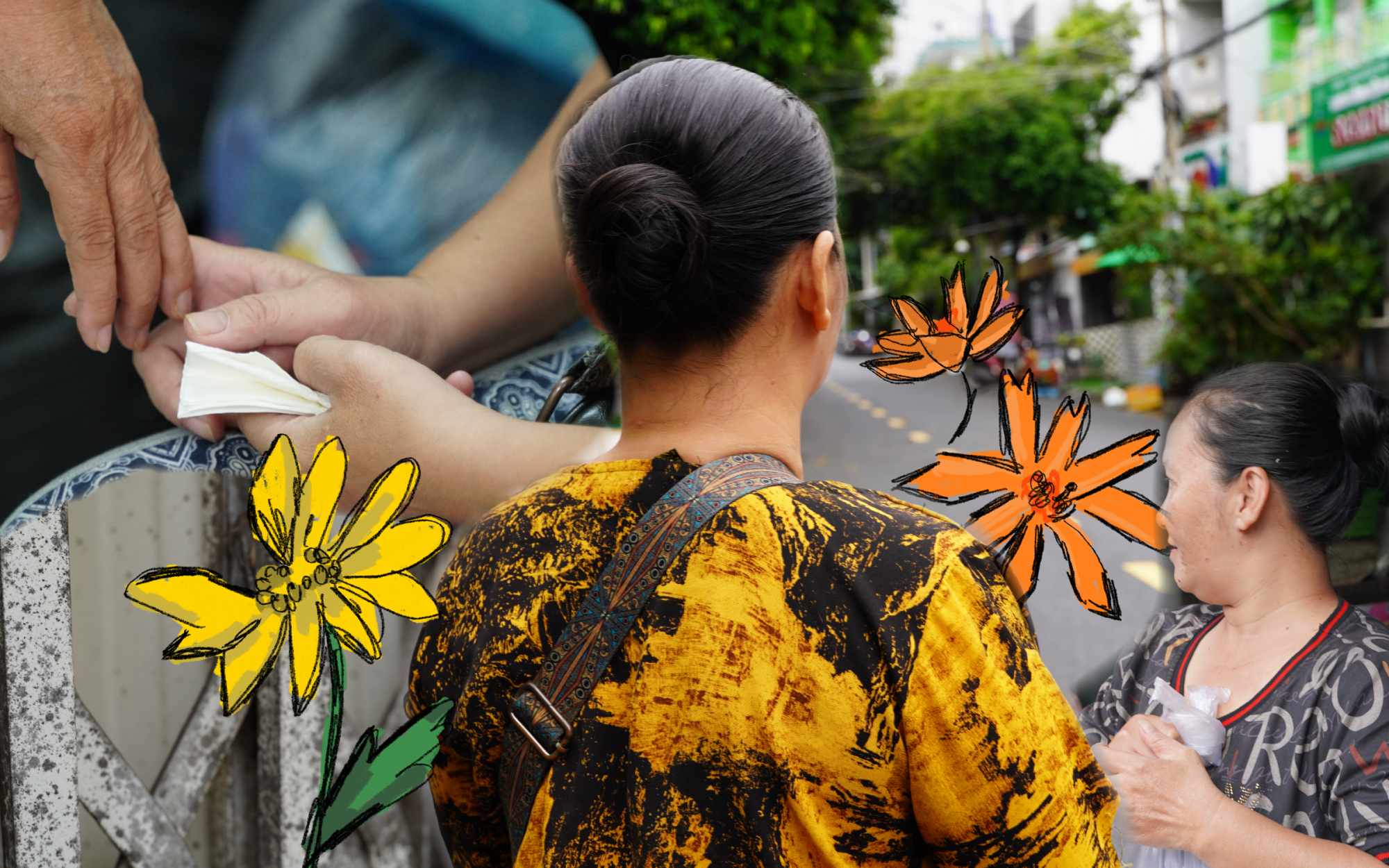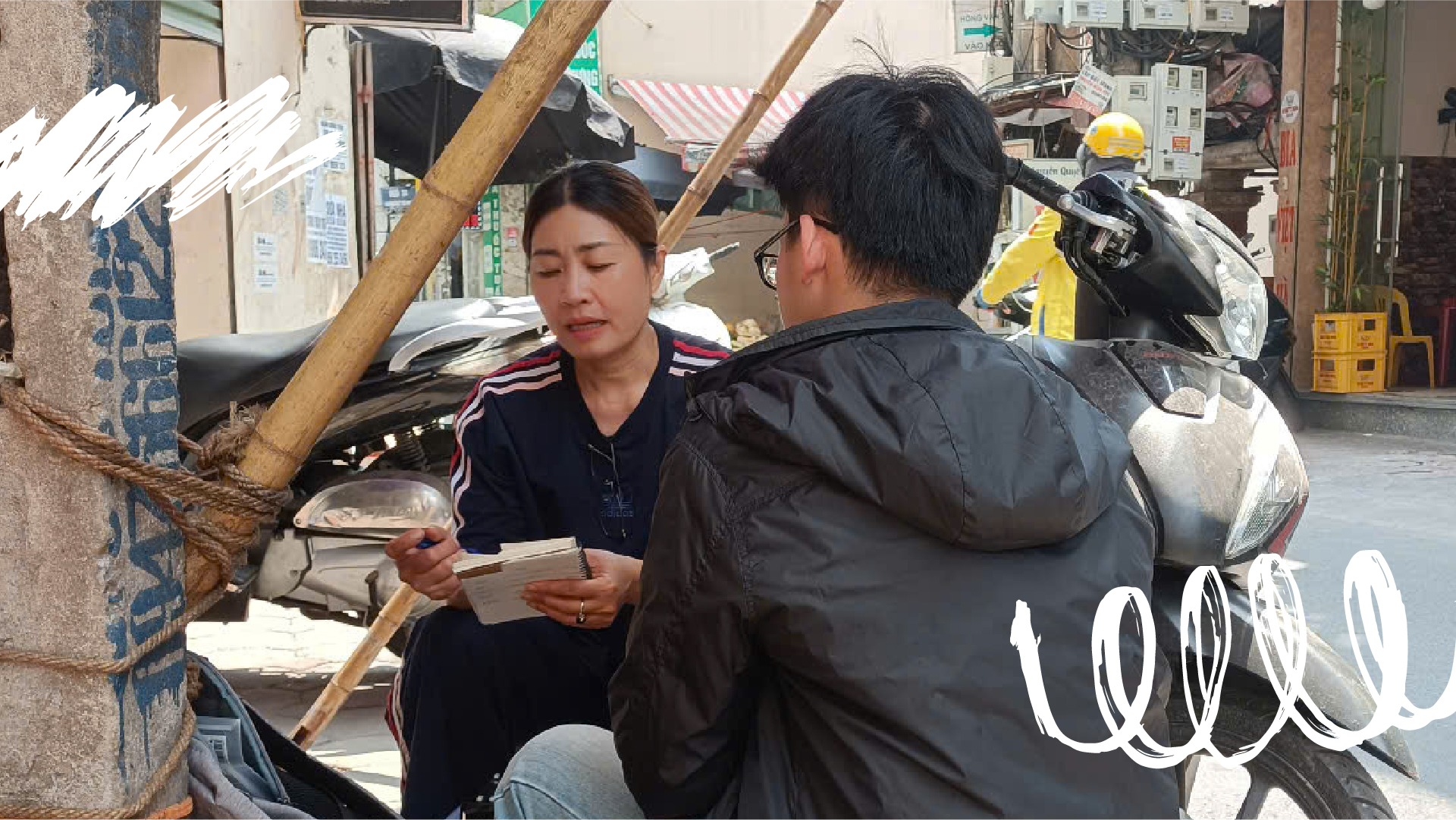Story of the dawn
“Previously, I named the group Huong Lua (Fragrant Rice) because I thought it was interesting and beautiful... Later, I came up with the name Ban Mai Xanh (The Blue Dawn). This Northwest place is full of green forests and fields. I just hope that tomorrow morning, when the dawn comes, the colour of hope will return to our village, our community...”
With a soft voice, Thi told us about his group’s name. The scar on the corner of his eye from a recent near-fatal accident does not diminish the gentleness and humility of this man, whose life has been through lots of ups and downs.
With a soft voice, Thi told us about his group’s name. The scar on the corner of his eye from a recent near-fatal accident does not diminish the gentleness and humility of this man, whose life has been through lots of ups and downs.
THE NEW SUNSHINE - WHERE LOVE BEGAN
When he was only seven years old, Thi followed his family from Thai Binh to Dien Bien. As the youngest son, Thi was pampered by his parents, dropped out of school early, and followed his friends on fun days. Then, like many other young people living in Dien Bien – a border province with the heroin transport route from Laos to China, he became addicted to drugs and had the HIV virus.
“Back then, whenever my mother did laundry, she poked my clothes back and forth with a meter-long stick, soaking them in bleach. The rough blue pants became camouflage pants...”
The image of those stained rough pants always reminded him of the long, sleepless nights he lived in discrimination from his relatives and self-stigma, in fear and emptiness when thinking about his future.
“Back then, whenever my mother did laundry, she poked my clothes back and forth with a meter-long stick, soaking them in bleach. The rough blue pants became camouflage pants...”
The image of those stained rough pants always reminded him of the long, sleepless nights he lived in discrimination from his relatives and self-stigma, in fear and emptiness when thinking about his future.

Meanwhile, La, a girl who grew up in Moi village, had sad memories of her youthful love when HIV took away the person she loved and left her with a life closed within four walls.
I didn't want to live anymore; it's so painful, people didn't understand like now
“At that time, my lover passed away, and I became HIV infected. I didn’t want to live anymore, it’s so painful, people didn’t understand like now. When I went to a wedding or banquet, people didn’t even dare to sit next to me...”

No one knew that during the days of participating in Tia Nang Moi (The New Sunshine) – the support group for people living with HIV in 2008, a ray of love had glimmered in these two independent lives but with many common feelings.
“Actually, when we first got together, both families were against us. According to the elders at that time, the husband was an addict, and the wife was sick, so how could we live together? We could only make each other suffer...”.
But La was determined to live under the same roof as Thi. Difficulties piled up in the early days of living together. When it was not even rice season, the family ran out of rice, and the couple’s only asset was a broken bicycle.
But La was determined to live under the same roof as Thi. Difficulties piled up in the early days of living together. When it was not even rice season, the family ran out of rice, and the couple’s only asset was a broken bicycle.


“When we got together, I still remember it was New Year’s Eve. We wanted to see fireworks on the street. We rode together despite the old bike. Everyone on the street was riding motorcycles and whizzing by. I didn't know what kind of power we had, but we were happy, just riding that old bicycle…”.
With love and perseverance, La convinced Thi to enter methadone treatment in July 2011. A new chapter in life opened when the couple and the Commune Community Learning Center embarked on a journey to communicate to the villages about HIV infection prevention in the community. They were still on the old bicycle that did not even have a mudguard.
With love and perseverance, La convinced Thi to enter methadone treatment in July 2011. A new chapter in life opened when the couple and the Commune Community Learning Center embarked on a journey to communicate to the villages about HIV infection prevention in the community. They were still on the old bicycle that did not even have a mudguard.
LOVE GREW WITH SACKS OF RICE
Thi stated that La’s mother did not approve of him when he first came out. She hesitated when the future son-in-law had not yet escaped addiction while her daughter was dealing with the disease. Every time La wasn’t home, she would come over and politely tell Thi to leave home. However, his dedication and sincerity gradually touched that mother’s heart.
His mother-in-law initially handed his wife three bags of rice, which she later raised to seven bags. After nearly a year, she realized he wasn’t that bad, and she even liked Thi more than her children. She just moved all the rice to his house.
His mother-in-law initially handed his wife three bags of rice, which she later raised to seven bags. After nearly a year, she realized he wasn’t that bad, and she even liked Thi more than her children. She just moved all the rice to his house.

Now I’m her favourite son-in-law!

JOURNEY TO OVERDOSE RESCUE 24/7
If it weren’t for Thi and La, many people would die here because of drugs.
In 2016, under the technical guidance of the Center for Supporting Community Development Initiatives (SCDI), Thi and his team members began the journey to overdose rescue in their village. After nearly four years of implementing rescue activities, Ban Mai Xanh Group has saved 143 people. The first overdose rescue was always an unforgettable memory for these “knights who save lives from overdose”.
.png)
“I was still on probation for three months at that time. I received news from neighbours that the victim was thrown into the pond to “awaken” and was floating. Everyone and I picked him up; his clothes were all wet. I followed the procedure. Then, the victim regained consciousness. While trembling, scared, and happy, I called to show off and told the project officer over and over again...”
“I was shaking and sweating the first time I did the rescue treatment. I could faint if someone were doing something behind me or startling me at that time. I felt accomplished after the rescue, but my arms were still trembling...” –said Son, a member of the group.
“Someone called me that day, and I had no idea who the victim was. When I arrived, I saw my best friend was lying there. I started doing chest compressions, but he wasn't awake yet, so I was so scared and I cried. When he opened his eyes, I was still crying and joyful at the same time...” – Trung, a member of the group.
While they were telling us their thrilling memories, someone shouted, “Thi, quickly, quickly, someone from Xom village has been overdosed...”. We immediately got on their motorbikes and followed them to the scene.
“Someone called me that day, and I had no idea who the victim was. When I arrived, I saw my best friend was lying there. I started doing chest compressions, but he wasn't awake yet, so I was so scared and I cried. When he opened his eyes, I was still crying and joyful at the same time...” – Trung, a member of the group.
While they were telling us their thrilling memories, someone shouted, “Thi, quickly, quickly, someone from Xom village has been overdosed...”. We immediately got on their motorbikes and followed them to the scene.



Far away, a group of people were scurrying, a man was lying on the side of the road, unconscious. Members of the group split up to perform first aid and quickly injected naloxone. “The patient stopped breathing. Son, do chest compressions…”
The faces looked tense, sweat pouring down. Everyone seemed to be holding their breath, waiting, and praying. Then, when the pink colour returned to that face, we breathed a sigh of relief. A life has just been saved, narrowly.
The faces looked tense, sweat pouring down. Everyone seemed to be holding their breath, waiting, and praying. Then, when the pink colour returned to that face, we breathed a sigh of relief. A life has just been saved, narrowly.

Along the way home, Thi laughed and told me a funny memory about an evening when he and his wife went to the rescue. When the victim woke up, he heard footsteps approaching him, “Brother, there is another case of overdose over here...”. And so, holding a syringe in one hand, still wearing shorts, shirtless, he jogged all the way, forgetting about his motorbike.
However, not all overdose rescues were cheerful. There were times when the patient was rescued, woke up, and misunderstood he was a robber, grabbed his collar, and was about to beat him. When he was unable to save a life, “I felt like my legs couldn’t walk anymore”.
However, not all overdose rescues were cheerful. There were times when the patient was rescued, woke up, and misunderstood he was a robber, grabbed his collar, and was about to beat him. When he was unable to save a life, “I felt like my legs couldn’t walk anymore”.
Some people argue that these drug addicts should die, so saving them is pointless. But my wife and I don’t perceive it that way; after all, it is a human life...
Does the love for community work make Ban Mai Xanh more steadfast on this arduous journey?
COMPANIONS
Thi thoughtfully talked about the early days of calling people to join the group, which were full of difficulties. Due to the characteristics of the area being a highland province, the majority are ethnic people. During his early visits to the village to meet people who used drugs, he was frequently told, “I'm addicted anyway,” “HIV is dead,” and “Don't go anywhere”,... But he was fortunate to be accompanied by La. Because she was a local, she helped Thi translate and assisted him in getting closer to the people.

“Once, we went to Hanoi for training. The bus car’s air conditioner broke down on the way back to Dien Bien, so Thi fanned us for around 2-3 hours..."
What hooks people's hearts in the middle of a simple mountain area is not flowery words but a sincere, humble heart. With that enthusiasm, Thi has formed the Ban Mai Xanh group with 17 core members and is proud that no one is still using drugs.

When the dawn came to the village
No one dared to enter our house when we lived together in the past. When children entered our house, they were chastised by adults. Now that they have a better understanding, they are willing to share and go out to eat and drink...
“Many people say that without Thi and the project, many people would have died. My house is near hot spots, they just call, and I’ll go right away. Everyone in the area knows and supports us”.
Gone are the days when people were still hesitant about a young man coming from the plain to the mountain to do community work, now, the little house of Thi and La is a familiar address for the people of Xom village and nearby communities.
Gone are the days when people were still hesitant about a young man coming from the plain to the mountain to do community work, now, the little house of Thi and La is a familiar address for the people of Xom village and nearby communities.

.png)
Not only receiving the love of the villagers, Ban Mai Xanh is also trusted by the local government and recognized for many significant contributions to the prevention of HIV/AIDS infection in the locality. Every month, group members still organize community communication sessions on overdose rescue and HIV infection prevention.
“Thi has saved people’s lives in our village from overdoes. Everyone in our village respects and does not despise Thi.” Son – the village chief of Xom.
“Thi has saved people’s lives in our village from overdoes. Everyone in our village respects and does not despise Thi.” Son – the village chief of Xom.
Article and photos: Thảo Trang
Copyright 2023 Center for Supporting Community Development Initiatives (SCDI) - Vietnam.




